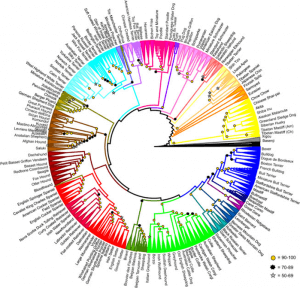Over the last decade interest in family ancestry has surged – websites such as Ancestry.com and shows including Who Do You Think You Are? have fuelled this. Just as humans have DNA, so do dogs with each breed having a distinctive set of markers. It was only a matter of time that curiosity would stretch to our pets’ ancestry.
This year geneticists at the National Human Genome Research Institute in Maryland produced one of the most fascinating insights into evolution of modern dog breeds. Having collected 1346 DNA samples from dogs over 20 years that represent around 161 breeds, the researchers compared the differences at 150,000 spots on each dog’s genome. This enabled the team to build a family tree for 161 breeds, finding these fell into 23 groupings (referred to as “clades”) based on their common ancestries (see image). Unsurprisingly, dogs bred for specific traits such as herders, fell into one group which included Border Collies and Corgis. However, the data also found some breeds helped create others; for example, despite the Pug originating from China, DNA suggests it was used from the 1500s in Europe to develop small dogs and toy breeds as the Pug’s genomes are still present today.
With DNA home-testing kits now readily available, pet owners can become their dog’s own evolutionary breed detective.
The benefits of DNA testing
The other day I spotted a conversation on Facebook – the originator asked for a DNA kit recommendation for her dog. Among the replies was “Why bother?” and this got me thinking about the benefits of DNA testing, prompting this post!
- DNA testing can help breeders and owners gain knowledge about the breed (or breeds) involved in producing a litter. This serves to inform owners of potential genetic health conditions that could occur and, therefore, develop a preventative health care plan to avoid costly veterinary bills. Whilst modern advances in medicine have alleviated many traditional canine health problems, such as parvovirus (Bradshaw, 2016), modern breeding has presented a new challenge to dog welfare. For example, Syringomyelia is a progressive condition relating to breeding for a neotenous domed head often found in Cavalier King Charles Spaniels. Rooney and Sargan (2009) argue the arrested development of the skull is a pre-requisite for this disease. A recent study of 500,000 German Shepherd Dogs also found 1 in 6 died from musculoskeletal disorders, with nearly 15% dying from an inability to stand (O’Neill et al., 2017).
- Identify potential personality traits. The field of genetic study in canines has grown in recent years leading to the discovery of a number of genes involved in coat colour, size and personality traits. Whilst a dog may ‘appear’ to look like one breed, appearances can be deceptive! DNA testing can reveal the actual breeds involved in your pet’s genetic make-up, which will tell you a lot about what you can expect about your dog’s behaviour, and training plans can be tailored to meet your pet’s needs. Moreover, dogs also play an important role as companions and helpers (such as Assistance dogs). Because a dog’s personality influences its ability to carry out such functions (Jones and Gosling 2005), understanding the breeds traits that are in the mix can help determine whether the pet is suitable for particular lines of work.
- Legal cases. There are a number of banned breeds listed under the Dangerous Dogs Act 1991 in the UK, these include; Pit Bull Terrier, Japanese Tosa, Dogo Argentino and Fila Brasileiro. This means it is illegal to buy, gift, abandon or breed from one of these breeds. According to the Gov.uk site, “Whether your dog is a banned type depends on what it looks like, rather than its breed or name.” How often have you read a horrific news story about a dog attack and the animal has been described as a “Pit Bull type”? The Pit Bull often gets a bad rap and there have been cases where family pets have been seized and euthanised simply because of their appearance. One much publicised case was that of Hank – taken by the local council in 2016 and was due to be PTS. A petition to ‘Save Hank’ resulted in over 115, 000 signatures, he was eventually returned home.
- Help in rehoming. Some breeds struggle to be rehomed more than others based on looks. DNA testing can prove invaluable to rescue centres in helping to promote those dogs that otherwise might have been passed over for adoption based on their looks alone.
- Reuniting pets. Another asset of DNA testing is that it can be used in tracking down lost pets where microchipping details / collars and tags are either out-of-date or not present.
- Poop patrol. In the last couple of years a number of pilot schemes have launched across the country, where a registry of dog DNA is held and local councils test the DNA in dog poop in a bid to catch owners who fail to scoop the poop! Obviously these schemes are only as good as those that voluntarily register their pets but it’s a step in the right direction.
There are a range of tests available from Wisdom Panel, DNA MY Dog, PetGen and Via-Pet, these are available from online resellers and cost around £37 to £70.
Curiosity killed the cat…
Whilst DNA testing serves a number of useful functions, including revealing if your pooch really is a pure-breed or a fantastic mix, it just might reveal some hidden truths…Enjoy the video!
References
- Bradshaw, J. (2016) Genetic welfare problems of companion animals – UFAW. Available at: http://www.ufaw.org.uk/genetic-welfare-problems/overview [Accessed 30 November 2016]
- Jones, P., Chase, P., Martin, A., Davern, P. and Ostrander, E.A. (2008) ‘Single-nucleotide-polymorphism-based association map-ping of dog stereotypes.’ Genetics 179 p.1033–1044
- O’Neill, D.G., Coulson, N.R., Church, D.B. and Brodbelt, D.C. (2017) ‘Demography and disorders of German Shepherd Dogs under primary veterinary care in the UK.’ Canine Genetics and Epidemiology 4(7)
- Rooney, N. and Sargan, D. (2009) Pedigree dog breeding in the UK: A major welfare concern? Available at: https://www.rspca.org.uk/adviceandwelfare/pets/dogs/health/pedigreedogs/report
Learn more about our classes

Get Hanne's book, clothing and more
Hanne has a number of publications including her book Playing With Your Dog to help owners work out the games that are best suited for their pet to play throughout his life, from puppyhood to old age, available from Amazon. Check out Hanne's range of contemporary casuals The Collection – for pet lovers made from recyclable, organic materials that are sustainably sourced.


